
Guests
- Craig Mokhiberinternational human rights lawyer who formerly served as the director of the New York Office of the United Nations High Commissioner for Human Rights.
The Trump administration is facing growing criticism for suspending visas for Palestinian passport holders, including for Palestinian officials set to attend the annual U.N. General Assembly this month. When the U.S. denied a visa to Yasser Arafat to address the U.N. in 1988, the General Assembly was moved to Geneva — the U.N. faces similar calls now. The move by the U.S. is “an indication of the unprecedented degree to which the U.S. government has handed the levers of its foreign policy over to the Israeli regime,” says Craig Mokhiber, an international human rights lawyer who formerly served as the director of the New York Office of the United Nations High Commissioner for Human Rights. He resigned in October 2023 over the U.N.’s failure to adequately address large-scale atrocities in Palestine and Israel.
Mokhiber also says there is more the U.N. could do to stop the genocide in Gaza. The General Assembly has the ability to circumvent the Security Council with a “United for Peace” resolution that could force “concrete action” in Gaza.
Transcript
AMY GOODMAN: This is Democracy Now!, democracynow.org. I’m Amy Goodman, with Nermeen Shaikh.
NERMEEN SHAIKH: The Trump administration is facing growing criticism for suspending visas for Palestinian passport holders, including for Palestinian officials set to attend the annual U.N. General Assembly in New York later this month. When the U.S. denied a visa to Yasser Arafat to address the U.N. in 1988, the General Assembly was moved to Geneva, Switzerland — and the U.N. faces similar calls now.
This comes as Belgium says it will recognize a Palestinian state at the U.N. General Assembly this month, along with France, Britain, Canada and Australia. Belgium also plans to impose 12 sanctions on Israel, which include a ban on all products from illegal settlements in the West Bank and a review of public procurement policies with Israeli companies.
AMY GOODMAN: For more, we go to Niagara Falls, where we’re joined by Craig Mokhiber, international human rights lawyer, formerly served as the director of the New York Office of the United Nations High Commissioner for Human Rights, where he worked for more than three decades as a human rights official. He resigned in October 2023 over the U.N.’s failure, he said, to adequately address large-scale atrocities in Palestine and Israel. His new piece for Mondoweiss is headlined “How the UN could act today stop the genocide in Palestine.”
Craig, welcome back to Democracy Now! Let’s begin with this denial of any visas for Palestinian passport holders. Talk about who the Palestine delegation is and what it means as Western state after Western state, joining more than a hundred others, will recognize a Palestinian state, but the Palestinian officials at the U.N. will not be allowed to be there. Does this threaten the whole notion of what it means to have a United Nations?
CRAIG MOKHIBER: Well, Amy, thanks for having me.
I mean, first, I have to say that this trend of the denial of visas for Palestinians is just the latest step in what has been an expanding U.S. government trend of effectively importing the racist ideology of the Israeli regime into the laws and policies of the United States.
This particular Trump and Rubio policy has been rolled out in three phases, first, barring visas for Palestinians from Gaza, including children horribly wounded by Israeli attacks who are seeking medical treatment in the U.S., but that already an incredible act of cruelty. And then, of course, it later announced that it was barring visas essentially for all Palestinians by denying visas to Palestinian pass holders — passport holders, whether they’re from Gaza or the West Bank or any country in the diaspora. And now, as you say, it has announced that it will deny visas to the Palestinian delegation to the United Nations, including the Palestinian President Mahmoud Abbas and 80 Palestinian delegates who are supposed to be participating in the General Assembly in September.
I have to say, first, this is a direct breach of the legal obligations of the U.S. under a binding U.N. headquarters agreement and under the Convention on the Privileges and Immunities of the United Nations. So it’s indicative not only of the lawlessness of the Trump administration, but it’s also an indication of the unprecedented degree to which the U.S. government has handed the levers of its foreign policy over to the Israeli regime. And the result has been further isolation of the U.S. on the global stage.
And it is not lost to anyone who follows the United Nations that the U.S. is barring the Palestinian delegation from attending the U.N. General Assembly precisely during a session that will have as its centerpiece the situation in Palestine, the genocide in Gaza, the recognition of Palestinian statehood, as you’ve said, by a number of new additional delegations, a conference on the two-state solution, and, very importantly, in advance of extraordinary action that’s expected in the U.N. General Assembly when the U.N.’s one-year deadline for Israeli compliance with the demands of the International Court of Justice and the U.N. General Assembly expires in September, and at which point the U.N. General Assembly is expected to adopt further measures to hold the Israeli regime accountable.
It will not work. The U.S., as you say, has tried this before, in 1988, by barring Yasser Arafat. The result of that was for the GA to move to Geneva in an act of global solidarity that further isolated the U.S. at that time, as well. It won’t work this time, as well. The GA may not move to Geneva this time, because it doesn’t need to. There is modern technology that allows participation from around the globe. There is a Palestinian delegation that is resident in New York. So, it may not be necessary, but it’s already clear that the U.S. has failed, that it is further isolated, and that the Palestinian voice in the U.N. will not be silenced. It wasn’t in 1988. It won’t be in 2025, and it won’t be in the future.
NERMEEN SHAIKH: Well, Craig, you mentioned this. Let’s talk about that, the options that are available to the U.N. General Assembly as we approach the 18th of September, the deadline that you mentioned, which is the expiration at the U.N. for Israel to comply with the International Court of Justice on ending the occupation and implementing provisional orders. People think that with the Security Council deadlocked because of a perpetual U.S. veto, there is nothing the U.N. can do. But the U.N. General Assembly does actually have the power to intervene. If you could explain what the “Uniting for Peace” resolution is, when it was last used and how effective it’s been?
CRAIG MOKHIBER: Yes, that’s right. There is this mechanism in the United Nations General Assembly, known as “Uniting for Peace.” It has been long on the books, adopted in 1950. It has been used many times, sometimes with very practical effect, other times just symbolically.
But there is an opportunity now to use it to actually change the situation on the ground in Palestine, despite the U.S. veto in the Security Council. You know, far too many delegations have gotten into the habit of hiding behind the U.S. veto by throwing up their arms and saying, “Well, we tried, but the U.S. vetoed it.” But Uniting for Peace allows the member states of the United Nations, 193 of them, in the General Assembly, to circumvent the U.S. veto and to adopt concrete action, as it did, for example, in 1956 by mandating the U.N. emergency force to deploy to the Sinai in the middle of the Suez Crisis against the wishes of two Security Council members, the United Kingdom and France, and against the wishes of Israel. It could do the same thing now, in September, by mandating a U.N. protection force for the people in Gaza and, more broadly, in Palestine, that is specifically mandated to protect civilians, that is mandated to ensure the delivery of humanitarian aid, to preserve evidence of Israeli war crimes and to begin the process of reconstruction, most importantly, to change the incentive structure for Israel and its co-conspirators in the genocide that’s happening in Palestine.
Other measures could be adopted in such a resolution — for example, denying the credentials of Israel in the U.N. General Assembly, as has — as was done with apartheid South Africa; establishing a criminal tribunal to hold Israeli perpetrators to account; reactivating the anti-apartheid mechanisms to deal with Israeli apartheid — a whole range of measures that could be adopted, that would have actual teeth and that could not be vetoed by the United States or any other state. And there is an indication, from previous votes around Palestine, that they would have the two-thirds majority that is necessary for adopting these measures in the General Assembly. Israel would have no legal right to refuse or to obstruct.
And this is the final important point that I’ll make on this one. Just last year, the International Court of Justice, the highest court in the world, found that Israel has no sovereignty in Gaza or the West Bank. It has no legitimacy, no authority and no right or legal standing to either consent or to refuse the intervention of a force to protect the Palestinians. The state of Palestine has requested such a force. Palestinian civil society, across the board, has demanded such a force. And there’s an opportunity here now for that to actually be created in September.
AMY GOODMAN: Two quick questions. You know U.N. Secretary-General António Guterres very well. You were at the U.N. for more than three decades. Is it just him that’s stopping this from moving forward? And how would a Palestinian state, the recognition [of] it [by] more and more countries, stop the assault on Gaza?
CRAIG MOKHIBER: Well, it’s not the secretary-general. He has no real power here, although there’s much more he could have done in the past two years of this genocide, to use the visibility of his office, the influence of his office, to, first of all, call out the genocide by name, and also to call on states to take the kind of measures that we’re discussing here today. These have always been on the table. They could have happened at any point during this genocide.
But the beauty of the Uniting for Peace mechanism is that the secretary-general cannot block it, the Security Council cannot block it, the United States cannot block it. It only requires a two-third majority of the member states. There is a move underway to build that majority now, and the hope is that that will take place.
Now, you asked: What could obstruct it? A lot of things could obstruct it. The United States does not play fair in international diplomacy. One could expect that, acting on behalf of Israel, it will use every carrot and stick — sticks, in particular — threats against delegations, not just allies, but delegations with developing economies that rely upon foreign aid, although foreign aid has been effectively slashed.
AMY GOODMAN: We just have 30 seconds, Craig.
CRAIG MOKHIBER: So, the threats could derail this by the United States, but hopefully the world is ready to stand up and provide protection. Under the glare of publicity, every state will have to say they either do or do not support protection for a people undergoing genocide.
AMY GOODMAN: And how would Palestinian statehood stop genocide?
CRAIG MOKHIBER: It will not. It is important, but most of the world has already recognized a Palestinian state. Some of these things, these distractions of recognition, of talking about two-state solution, in the middle of a genocide that is burning across the land, is not the kind of focus that we need. We need protection for the Palestinian people, and we need the beginning of their liberation, of their freedom from —
AMY GOODMAN: We have to leave it there. Craig Mokhiber, international human rights lawyer, thank you so much for joining us. I’m Amy Goodman, with Nermeen Shaikh.

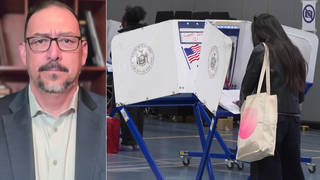

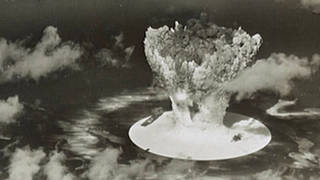
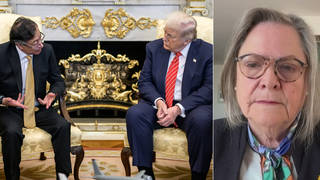





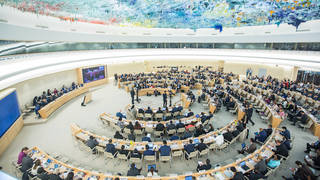

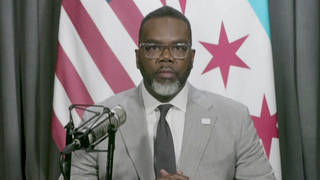
Media Options